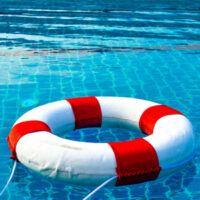Private Pool Safety In Florida

Because of Florida’s weather, swimming pools are open far longer than they might be in states up north, especially private pools where the homeowner can make the choice to take the cover off. However, while your backyard pool can be a great way to pass time and get exercise, especially as the COVID-19 pandemic continues, it is still important during any season of the year to make certain that your safety protocols are in place. If your pool safety precautions are not working, you might wind up being liable for another person’s tragedy.
Causes & Effects
There are many different causes of potential injury near a pool that can affect people of any age group, though the most pool-related injuries and fatalities tend to occur in very young children and the elderly due to a lack of mobility or comprehension of risk. In recent years, Florida has been the leader in drownings of children aged 1-5 – it has even been the leading cause of death for that age group. In these two age groups, falls may lead to drowning, but even non-fatal falls can be very serious, causing anything from broken bones to spinal or brain damage.
Some of the other common ways that pool-related injuries happen include unsafe water (leading to a lack of visibility or to conditions related to chemical poisoning), defective safety devices like gates or pool covers, or a failure to keep the deck or other surrounding areas clear of obstacles or debris. In a community pool or other swimming area open to the general public, a lack of lifeguards can be actionable sometimes, but the standard for backyard pools is slightly different. Negligence cannot be assumed solely by the lack of the homeowner’s presence.
Must Have Safety Precautions Installed
If you or one of your children has been injured in a backyard pool, and you believe that it was due to the negligence of someone else, you may be able to find them liable for the harm that you or your loved one suffered. Florida has a specific code of laws mandating that certain safety standards be upheld by owners of backyard pools, and a failure to have at least one safety protection installed of five: (1) an enclosure that isolates the pool from the home; (2) an ‘approved’ pool cover; (3) an alarm that covers all possible doors and windows from the home into the pool area that reaches a certain decibel level; (4) locks at at least 54” on every door that gives access to the pool; or (5) an alarm that sounds if someone enters the pool unauthorized.
If the pool where you or your loved one was injured has at least one of these, it does not mean that you are out of options for holding them accountable. You may be able to file suit based on common-law principles, or on another point of law that is more unique to your situation. If you are able to show that the pool owner owed a duty to exercise reasonable care toward their guests, and failed to exercise it, the owner may be liable if you can show their actions (or inactions) caused your injuries, regardless of the statutes.
Contact A Tampa Pool Safety Attorney
Floridians love to swim, and love their backyard pools, but many do not understand that when they are open, the owner may bear responsibility for injuries or fatalities that happen there. If you or a loved one have been injured in a pool-related accident, calling the Tampa personal injury attorneys at the Rinaldo Law Group is a good idea. We can work with you to give you the best possible understanding of your options to move forward. Call us today for a free consultation.
Resource:
miamiherald.com/news/state/florida/article193776489.html
https://www.tampainjuryaccidentlaw.com/catastrophic-injury-accident-cases/












